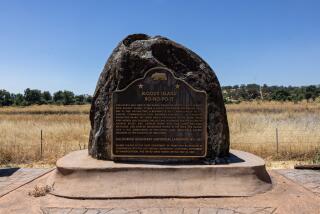What’s in a Name Change? Just a Day in Court
- Share via
Bailiff Henry Stewart refers to Department 1A of Los Angeles Superior Court as the “Twilight Zone.” That’s because many a person who walks through the wooden doors emerges as someone else.
Juan Carlos Lopez Ramirez, who underwent a sex-change operation last year, walked out as Carla Lopez. Actor Peter S. Choi of Santa Monica stepped into the new role of Pete Red Sky. And Asanai Viwatana became Kullaphat Viwattanamongkolkul. His new first name will bring luck, Viwattanamongkolkul explained in court papers, and restoring his full last name conveys respect for his ancestors.
“People change their names because a name has to be something you have to be comfortable with,” said Tiiu Leek, who took her son to court one morning recently. “It’s part of your identity.”
Leek’s son wanted to drop his formal name, Robert, in favor of his nickname, Bo. No one who knows him well calls him Robert anyway.
“A name needs personality,” said Leek, looking at her 10-year-old son, who is an avid hockey player. “Bo is a fun name and he’s definitely a Bo. Robert is more serious and that’s not him.”
Most people who visit Department 1A--or one of 15 other civil courts in Los Angeles County that process name changes--have pondered long and hard before coming up with a name more to their liking, one they hope helps create a positive image.
At Los Angeles County courthouses, anyone can change their name for just about any reason. Even jailbirds, parolees or registered sex offenders can receive fresh identities if the California Department of Corrections approves.
Last year, Department 1A was the site of 1,632 name-change hearings, which are held Thursday and Friday mornings.
People have been legally reinventing their names for centuries, said Leonard Ashley, a member of the executive council of the American Name Society.
“We judge everything by its package and the name is part of the package,” said Ashley, author of the 1996 book “What’s in a Name?” “If your name is Bambi, I won’t think you’re too smart. Gertrude is ugly and Bertha is considered fat.”
Americans are increasingly adopting novel names in their quest for a unique persona, Ashley said. For example, he said, he has found 35 ways to spell Diane. And he has even seen a variation of the name Michael spelled Mike-L.
In Los Angeles County, applicants fork over a $194 filing charge, an additional publication fee and then anxiously wait about six weeks for the court hearing where they are granted their new identity. The process is so simple that a lawyer is seldom needed.
A judge is rarely present either. The only time Commissioner Murray Gross at the downtown courthouse makes an appearance is to hear objections, some of which come from parents dead-set against their children doing away with their birth names. In such cases, the judge can rule against the name change.
On a recent Thursday morning, half a dozen or so applicants showed up more than 30 minutes early. Most were dressed casually, some in T-shirts, shorts and tennis shoes. Inside the courtroom, people freely whispered to friends and family members while court was in session. After going through a few minutes of formalities with court clerk Frank Aldana, they left happy.
In the last several years, the downtown courthouse has seen a rise in name changes by people who have switched sexes, said Arnie Keren, who has handled legal notices for the Daily Journal and Daily Commerce for two decades.
Other folks seek new names because the old ones invite teasing or laughter.
Walo Ninja, a 50-year-old native of India, was born outdoors. His mother went into labor in the midst of a fight with her husband’s girlfriend in the muddy backyard of his mother’s house. A friend of his mother who knew English suggested naming the child a variation of the word “wallow.”
Ninja said he was taunted in elementary and middle school. “They would say, ‘Come on, come on. Let’s wallow in the mud,’ ” said Ninja, whose name-change hearing is set for September. “And kids would push me into the mud.”
He has long introduced himself simply as Ninja. But he is launching an acting career and prefers to shorten his first name to W., he said.
Then there are the more heart-warming reasons why people desire an amendment.
Seated in the back of the courtroom, Michelle Byrd was anxiously awaiting her turn. She wanted to take the last name of her uncle, Eddie Fenison, the man she calls Dad.
Byrd, 33 and a single parent, moved in with her mom’s sister and husband, Fenison, at age 16 after her mother died of breast cancer. Even though she was not a blood relative, Fenison loved her just like his own three children, Byrd said. When she got her driver’s license at 17, he bought her a new 1985 Nissan Sentra, exactly what she had wanted.
“He’s the only father I know,” Byrd said. “It seems natural that I do this.”
The mother of 7-year-old Melisa Contreras also was at the courthouse, asking the clerk about having her daughter’s last name changed to her maiden name, Sanchez.
“Why carry her father’s name?” her mother, Maria, said matter-of-factly. “He has had nothing to do with her life since she was 2.”
Such changes are not unusual. But Aldana and Stewart say that a few times each month, they hear back from mothers who have completed the process for their children.
The reason, Stewart said, is that the change often is requested soon after a heated argument with the husband. Once the mother makes up with him, the bailiff adds, she asks to go back to the original name.
More to Read
Sign up for Essential California
The most important California stories and recommendations in your inbox every morning.
You may occasionally receive promotional content from the Los Angeles Times.










